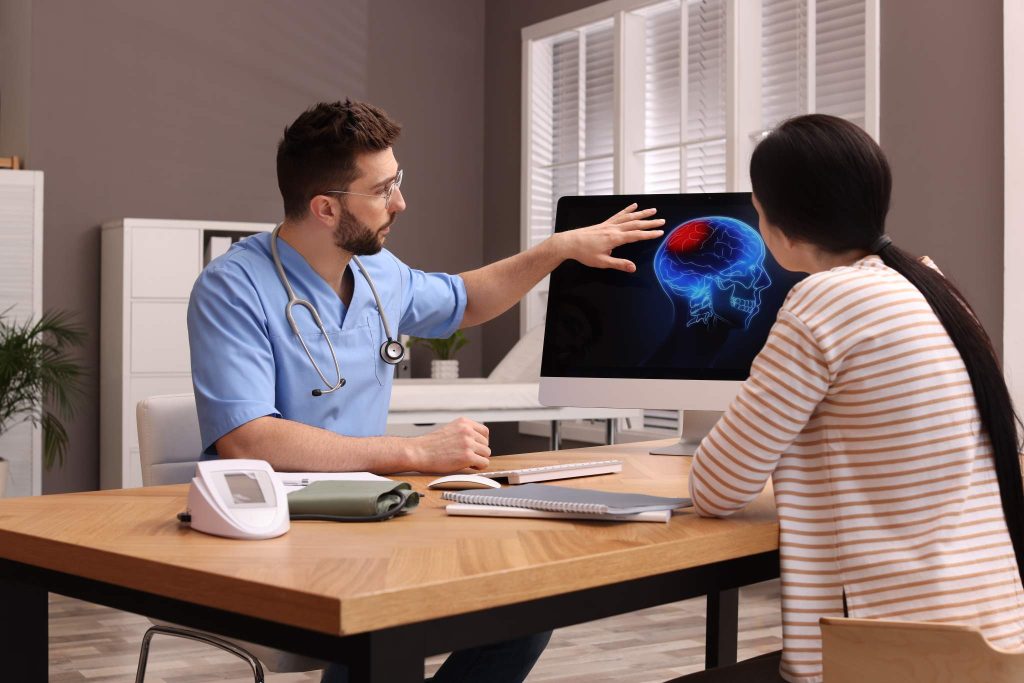Most of the time, sneezing is a simple annoyance and not a sign of anything seriously wrong. It may mean you have a cold, an allergy, or just simply need to sneeze. But for some people, sneezing can routinely cause pain in their arms. If this is the case, especially if you have arm pain at other times, it might be time for a trip to an Atlanta neurologist to ensure it isn’t a sign of a spinal injury. The cause can be anything from a pinched nerve to a serious heart-related condition, so it is always best to seek help from a professional who can make a proper diagnosis and treatment plan.
Why Do We Sneeze?
Sneezing is a mechanism the body uses to clear the nose of foreign objects. Sneezing is one of the body’s first defenses against bugs and bacteria that may cause illness.
When pollen, dirt, smoke, or dust enter the nostril, the nose can become tickled or irritated, triggering the body to sneeze in order to remove the substance. The lining of your nose is delicate, and even a slight tickle from these substances will send an electric signal to the brain, letting it know that your nose needs to be cleared. The brain then tells the body it’s time to sneeze, and the body prepares itself for the contraction. The eyes are usually forced shut, and the tongue moves to the roof of the mouth, while your muscles brace- all within a few seconds.
Sternuation, the medical term for sneezing, forces water, mucus, and air out of the nose with strong force. If they are present, they can also release germs. It has also been found that a sneeze acts as a sort of reset for the nasal environment.
For most people, frequent sneezing is normal as it relates to illness or allergies and is rarely of concern. In fact, it can sometimes be a simple habit. If you notice an uptick in your sneezing and are concerned, you can speak with a doctor about potential allergies or a condition called chronic rhinitis, in which the nasal cavity is inflamed. Even in these cases, sneezing itself is not dangerous, including when it causes pain.
Types of Pain After Sneezing
Here are several underlying reasons why different parts of your arm, from shoulder to fingertips, may experience discomfort when you sneeze.
Shoulder Pain When Sneezing
Shoulder pain during or after sneezing can occur due to the sudden force exerted on the body. This force can strain the shoulder muscles or aggravate existing conditions such as arthritis or rotator cuff injuries. The rapid movement can also temporarily increase the pressure on the spine, affecting nerves that run through the shoulder and leading to pain.
Elbow Pain When Sneezing
Elbow pain following a sneeze is often related to the nerves that pass near the elbow joint being compressed or irritated. The quick, jerky motion of a sneeze can cause muscles and bones to shift in ways that put pressure on these nerves, resulting in numbness or pain in the elbow area.
Hand Pain When Sneezing
Pain that radiates down to the hands and palms after sneezing may be due to the direct impact of nerve compression higher up in the arm or spine. The forceful contraction of muscles during a sneeze can lead to temporary shifts in body structure, affecting nerve pathways and causing pain or tingling in the hands.
Understanding Nerve-Related Pain
Pain that begins at the base of the neck and radiates to the fingers, especially if accompanied by a tingling sensation, could indicate a more serious condition, such as a coronary illness or nerve compression syndrome. These symptoms should not be ignored, as they may require immediate medical attention to prevent further complications.
Is It Normal for Sneezing to Hurt My Arms?
It’s not uncommon for sneezing to cause mild pain in people with no health conditions or spinal problems simply because of the unnatural force placed on the body. However, the intensity, location, and frequency of this pain may vary, and it is usually not normal for it to be intense or prolonged.
Common Causes of Arm Pain After Sneezing
Most causes of arm pain after sneezing can be related to the spine, as the force of a sneeze may cause short-lived stress to the spine. The vertebrae may be weakened or injured to some extent, or existing injuries may be worsened, leading to irritation of the surrounding nerves. When the impacted nerves connect to the arms, pain may be referred to that area. Below are some common conditions that may cause this pain.
Pinched Nerves
When a nerve is compressed, it can lead to pain, tingling, and numbness in the area of the body it controls. The sudden movement of a sneeze can cause a nerve that is already pinched to become more compressed, causing additional pain for a moment or even inflaming the tissue around the never further for worse pain in the long run. The movement may also cause enough of a shift in bone or tissue to compress a nerve that was not already in that position.
Dislocated Vertebra
The spine is composed of a series of bones, called vertebrae, stacked atop each other. When one of these small bones is moved out of place even slightly, it can cause the entire spine to function incorrectly, impacting nerves and causing pain throughout the body. This dislocation is most often caused by a trauma like a car accident or sports injury that results in a fracture.
Herniated Discs
Each set of vertebrae is cushioned by a small, gel-like disc that is meant to absorb shock and prevent friction between the bones. These discs have a tough exterior and an interior that is jelly-like. If the disc becomes displaced or damaged, the interior can leak into the surrounding spinal canal and encroach on nerves, causing pain. Herniated discs most often impact the lumbar spine and cause lower back pain, but it is possible for them to happen more near the arms.
Muscle Strain
When a muscle is stretched or torn, it becomes strained or pulled and causes some amount of pain in general. This usually occurs as the result of an injury or a fall and can make twisting, lifting, and otherwise exerting that muscle difficult or painful. Because sneezing places additional pressure on the nerves and muscles, a minor strain that did not hurt may show symptoms in the immediate aftermath of a sneeze.
Vertebral Compression Fractures
A VCF, or vertebral compression fracture, occurs when part of a vertebra collapses. This is especially common in people with the common bone-thinning disorder osteoporosis. People with serious forms of this condition may experience a fracture as a result of a sneeze rather than falls or other injuries that may cause them for someone with more bone strength. Only if you believe you have thin bones should you worry about a sneeze causing a fracture on its own.
Dangers of Arm Pain When Sneezing
Sneezing during driving is generally safe, though some people are uncomfortable with the momentary forced eye closure. However, there is an additional fear that when arm pain occurs while driving, there is increased potential of loss of control of a vehicle. This is because the pain caused by sneezes may cause a short block of sensory and control abilities, usually lasting only a few seconds. This time period could theoretically be long enough to cause a loss of control in a vehicle, though it is rare that the pain is sustained long enough for this to be a concern. If you have frequent and sustained arm pain after sneezing, you may avoid driving until you are able to treat the problem.
Preventing Pain During a Sneeze
If you feel a sneeze coming on and worry about the potential pain, the best thing to do is to stand up as straight as possible, avoiding slouching or sitting. A standing position will reduce the force on your spinal discs that could be created by a sneeze.
There is also some benefit to the idea that you should stand, leaning forward, with your hands on a solid structure like a table or countertop. This further reduces pressure on the spine and back muscles, though the pressure on your arms may also cause pain. You can try to stand flat against a wall with a cushion on your lower back as an alternative.
It is also important to never try to stop or “hold in” a sneeze, as this can cause the body to become tighter and may even lead to sinus injuries. This includes attempts to sneeze with your mouth closed or eyes open. While both are possible, it is better to let the sneeze reflexes happen naturally to avoid further aggravating the body in any way.
What if Sneezing Hurts My Back or Chest?
Because of the pressure placed on the spine during a sneeze, the same mechanics may cause pain in other parts of the body. Depending on where the spine is impacted may affect different nerves that send signals to other body parts as well. The underlying cause of back pain from sneezing may differ slightly from the pain that appears in the arms, but it should be treated similarly in terms of seeking medical care.
Chest pain after sneezing may result from similar problems, but it is more likely to be associated with cardiovascular disease than spinal problems. This is especially true when it radiates from the shoulder to the base of the neck and then to the fingers- this particular pain is not associated with sneezing and should be addressed immediately by a doctor. However, the pain from sneezing can also exacerbate other responses in the body, so this is not always the cause.
One other common problem is rib dislocation, which causes pain in both the chest and the upper torso. In rare cases, a simple sneeze is enough to actually cause a rib to become dislocated or separated. The pain from this will usually be prolonged and will require medical or chiropractic care to address.
When to See a Doctor
While the pain in your arm may go away quickly, it’s important to seek medical care at the first sign of a problem in order to prevent any worsening symptoms.
Any existing spinal or neurological condition should be treated independently of these concerns by a professional who will identify the root cause of the pain and create a treatment plan based on this diagnosis. Usually, the issue is not related to sneezing, but what conditions in the body are being irritated by the act of sneezing.
However, if you are sneezing extremely frequently or worry your sneezing is related to a serious illness, you may also visit an ENT doctor for more testing.
Managing Pain from Sneezing
In most cases, the best way to address arm pain that occurs after sneezing is to identify and remediate the root cause of that pain. This could mean focusing on the bones and nerves of the spine in order to be sure they are aligned and functioning as they should so that sneezes do not exacerbate existing issues.
An Atlanta neurologist may recommend diagnostic scans, like x-rays or MRIs, in order to identify problem areas like pinched nerves and herniated discs. These scans provide information that can guide your treatment plan to make it as effective as possible. A combination of chiropractic care, physical therapy, and neurologic or orthopedic guidance are usually enough to manage the issue.
If strain or inflammation are of particular concern, exercises may be prescribed as part of an ongoing treatment plan. The goal is usually to prevent future pain while treating the underlying cause through non-invasive techniques. The risk of something like a car accident resulting from these conditions is low, so a medical team will focus on managing symptoms rather than making lifestyle changes like refraining from driving.
Comprehensive Care for Arm Pain
If you notice arm pain, or any other pain, after you sneeze, it is important to seek care before any potential conditions worsen. At AICA Orthopedics, our team of multi-disciplinary providers is dedicated to helping identify and diagnose the cause of your pain and creating a plan to achieve relief. Our staff includes neurologists, orthopedists, chiropractors, physical therapists, pain management experts, and radiologists all in one office to make your care as seamless as possible. Whether you need scans, exercise guidance, or surgery, AICA Orthopedics will be able to support your recovery. With all specialists able to communicate easily, you’ll avoid the time spent driving between doctors and rehashing your medical history.
Contact AICA Orthopedics today to begin addressing your arm pain.





